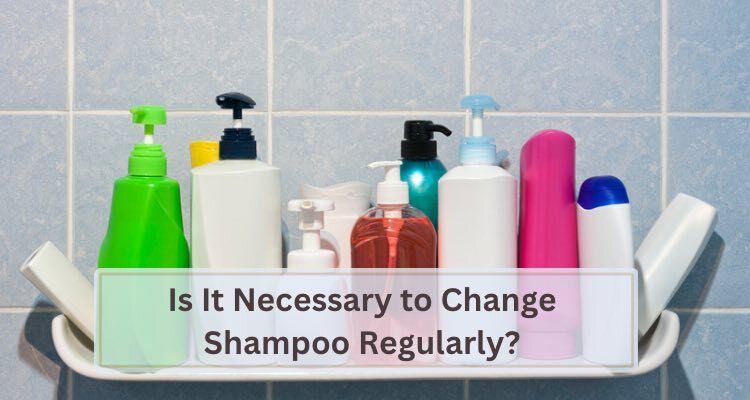Changing shampoos regularly is not a strict rule you must follow. However, switching shampoos can sometimes benefit your hair’s health and appearance.
Hair care is a personal journey. Each person’s hair has unique needs based on texture, scalp condition, and lifestyle. Sometimes, using the same shampoo over time may lead to buildup or less effective results. This is because your hair can adapt to the ingredients, reducing their impact.
Exploring new shampoos can introduce fresh ingredients that target specific concerns like dryness or oiliness. Additionally, seasonal changes might require different hair care solutions. Understanding your hair’s needs can help you decide if a shampoo change is necessary. This exploration can lead to healthier and more vibrant hair. Let’s dive deeper into why you might consider making the switch.
Credit: www.brilliancenewyork.com
Introduction To Shampoo Use
Shampoo is a staple in hair care routines worldwide. Its primary function is to cleanse the scalp and hair. Choosing the right shampoo can be daunting due to countless options. Many wonder if regular changes are necessary for optimal hair health. Let’s explore the world of shampoo use.
Common Myths
One common myth is that hair becomes immune to shampoo. People believe hair stops responding to the same product over time. This leads to the assumption that changing shampoos frequently is essential. In reality, hair doesn’t develop immunity. Hair needs remain consistent unless other factors change.
Another myth suggests changing shampoos prevents buildup. Buildup often results from product overuse or poor rinsing. Clarifying shampoos can solve this without changing products regularly. Understanding these myths helps in making informed choices.
Consumer Habits
Many consumers frequently switch shampoos. They seek new formulas, scents, or brands. Marketing plays a significant role in these habits. Advertisements often promise better results with new products. This creates a cycle of constant searching for the perfect shampoo.
Consumer reviews also influence buying decisions. Positive reviews can lead to trying a new product. This habit can be both beneficial and wasteful. Finding what works and sticking with it might be more effective.
Ingredients In Shampoos
Shampoos come with a variety of ingredients that cater to different hair needs. Understanding these components can help you make informed choices. The composition plays a critical role in how shampoos work. Some ingredients clean, others moisturize, and some offer protection. Knowing what goes into your shampoo can enhance your hair care routine.
Natural Vs. Synthetic
Natural ingredients often include plant extracts and essential oils. These are believed to be gentler on hair. People with sensitive skin might prefer natural shampoos. Synthetic ingredients are lab-created compounds. They can be more effective at certain tasks, like removing heavy buildup. Some synthetics mimic natural compounds but might work faster. It’s essential to find a balance that suits your hair type.
Role Of Active Compounds
Active compounds in shampoos target specific hair concerns. They can address dandruff, dryness, or oiliness. Ingredients like salicylic acid fight dandruff. Keratin helps strengthen hair and reduce breakage. Panthenol adds moisture and shine. These active compounds are crucial for a shampoo’s effectiveness. Choosing a shampoo with the right actives can improve your hair health.
Effects Of Frequent Shampoo Changes
Switching shampoos can impact hair health. Different formulas offer varied benefits and drawbacks. Regular changes might prevent buildup or irritation, but consistency supports hair’s natural balance.
Switching shampoos frequently can lead to unexpected changes in your hair and scalp. If you’ve ever wondered why your hair feels different after trying a new shampoo, you’re not alone. Let’s explore how these changes might affect you.
Scalp Health
Your scalp is sensitive to changes in products. Introducing a new shampoo can disrupt the balance of oils and moisture. If your scalp becomes dry, you might experience itchiness or flakiness. On the other hand, if the shampoo is too moisturizing, it could make your scalp oily. Think about how your skin reacts to new skincare products. The scalp behaves similarly. If you notice irritation, it might be time to revisit your shampoo choice.
Hair Texture And Strength
Different shampoos have varying formulations, which can affect your hair’s texture. Some might leave your hair feeling soft and smooth, while others might make it feel coarse or dry. Consider how your hair reacts to different weather conditions. Changing shampoos can have a similar impact. If your hair feels weaker or more prone to breakage, the shampoo could be the culprit. Have you ever felt your hair was less shiny or vibrant? It might be due to frequent shampoo changes. Your hair’s health and appearance can alter, depending on the shampoo’s ingredients. Could sticking to one shampoo be the key to maintaining healthy hair? The answer lies in understanding what your hair needs. Changing your shampoo isn’t inherently bad. The key is to listen to your hair and scalp’s responses. What changes have you noticed when switching shampoos? Understanding these effects could lead you to a more consistent haircare routine.
Factors Influencing Shampoo Choice
Choosing the right shampoo can be tricky. Different factors influence this decision. Hair type, environment, and lifestyle play a role. Understanding these factors helps in selecting the best shampoo.
Hair Type Considerations
Hair type matters when picking a shampoo. Oily hair needs a clarifying shampoo. It removes excess oil. Dry hair requires moisture-rich options. Curly hair benefits from sulfate-free formulas. They help maintain natural curls. Thin hair needs volume-boosting products. Thick hair can handle heavier formulations. Consider your hair type first.
Environmental Influences
Where you live affects your hair care needs. Humid climates might need anti-frizz shampoos. They help manage hair texture. Dry climates call for hydrating formulas. They prevent dryness and breakage. Pollution can lead to buildup. Use shampoos with deep cleansing properties. Seasonal changes also impact hair health. Adjust your shampoo as seasons change.
Benefits Of Sticking To One Shampoo
Choosing the right shampoo can be a game of trial and error. Once you find a product that works, sticking to it might be beneficial. Consistency can lead to healthier hair and a happy scalp. Let’s explore the benefits of using the same shampoo over time.
Consistency In Results
Using the same shampoo helps maintain hair health. Your hair gets used to the ingredients, leading to consistent results. There’s no need to adapt to new formulas. This consistency can boost your confidence in your hair care routine.
Avoiding Allergic Reactions
Switching shampoos often introduces new ingredients. This can increase the risk of allergic reactions. Sticking to one shampoo reduces this risk. Your scalp remains calm and irritation-free. This is especially crucial for sensitive skin types.
Credit: ningen.com
Signs You Need A Shampoo Change
Noticing itchy scalp or dull hair? These could mean your shampoo isn’t working anymore. Hair changes, so should your shampoo.
Are you wondering if it’s time to switch your shampoo? You’re not alone. Many people stick with the same product for years, but sometimes your hair might be trying to tell you it needs a change. Let’s explore some signs that indicate it’s time for a new shampoo in your routine.
Product Build-up
Over time, shampoos can leave residues on your hair and scalp. This build-up can make your hair feel heavy and look dull. If your hair feels sticky or looks flat despite washing, that’s a clear sign of product build-up. Have you noticed your hair losing its natural bounce? It might be the shampoo. Try clarifying shampoos occasionally to reset your hair and remove excess residue.
Ineffective Results
Is your shampoo not living up to its claims anymore? If you’re not seeing the shine, volume, or smoothness you expect, it might be time for a change. Sometimes, hair gets used to a shampoo’s formula, reducing its effectiveness. This can leave your hair looking less vibrant or healthy than it used to. A friend of mine stuck with the same shampoo for years. She noticed her hair wasn’t as shiny or smooth as before. Switching to a different product brought back the luster she missed. Could your hair need the same refresh? Think about your current hair needs. Do you need more moisture or volume? Switching shampoos might be just what your hair needs to meet those specific goals.
Expert Opinions On Shampoo Rotation
Experts debate whether changing shampoos is necessary. Some suggest it prevents product buildup and enhances hair health. Others believe sticking to one shampoo is fine if it meets your hair needs.
Switching shampoos can be confusing. Experts often share mixed views. Understanding these can help make informed choices. Some experts suggest regular changes. Others advise sticking to what works. Let’s see what dermatologists and hair stylists say.
Dermatologist Insights
Dermatologists often focus on scalp health. They believe product buildup can occur. This happens when ingredients stay on the scalp. Buildup can lead to irritation or dandruff. Changing shampoos might help prevent this. Dermatologists also note hair type differences. Oily, dry, or normal hair might need different care. So, alternating products could be beneficial.
Hair Stylist Recommendations
Hair stylists have a different view. They consider styling products and techniques. Some stylists recommend variety to maintain hair texture. Constant use of one shampoo can make hair dull. Stylists suggest alternating for better results. They also focus on hair goals. For example, color-treated hair may need specific shampoos. Stylists believe rotation helps achieve desired outcomes. “`
Credit: www.druidebio.fr
Frequently Asked Questions
How Often Should You Switch Shampoos?
Switch shampoos every few months to prevent product buildup and maintain hair health. Consider hair type and scalp condition for optimal results. Regularly assessing your hair’s needs can guide your choice. This routine can keep your hair vibrant and responsive to products.
Is It Ok To Use The Same Shampoo All The Time?
Using the same shampoo consistently is usually fine. Ensure it suits your hair type and addresses specific needs. Periodically reassess your hair’s condition and switch if necessary. Some people benefit from alternating shampoos to prevent buildup and maintain hair health.
Always choose products free from harmful chemicals.
Do Different Shampoos Really Make A Difference?
Yes, different shampoos make a difference. They cater to various hair types and conditions, offering specific benefits. Ingredients in shampoos target issues like dryness, dandruff, or color-treated hair. Choosing the right shampoo improves hair health and appearance. Always select a shampoo based on your hair’s unique needs.
Is It Okay To Use Old Shampoo?
Using old shampoo is generally safe, but check for changes in smell, texture, or color. Expired shampoo might lose effectiveness and cause scalp irritation. It’s best to replace shampoo every two years to ensure optimal hair care and safety. Always prioritize products within their shelf life for best results.
Conclusion
Switching shampoos can be beneficial. Different formulas offer varied nutrients. Hair types and needs change over time. Regular adjustments might enhance hair health. Listen to your hair’s needs. Observe changes in texture or oiliness. Experiment with new products when necessary.
Avoid settling for one shampoo. Variety in your routine can be refreshing. Stay informed about ingredients. Choose what suits your hair best. Personalize your hair care strategy. Balance is key. Finding the right shampoo may take time. Patience pays off.
Healthy hair requires attention and adaptability. Keep exploring options for optimal results.

Britt Wolfe is a beauty content creator and Amazon product reviewer with a passion for honest, research-backed skincare and haircare advice. With years of experience testing everything from serums to body butters, Britt helps readers discover products that truly work. When she’s not writing for BeautyGrowers, you’ll find her experimenting with clean beauty routines and decoding ingredient labels so you don’t have to.

